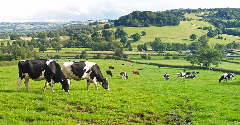News
FAO issues first forecast
11 Apr 2016World cereal production in 2016 is set to amount to 2 521 million tonnes, just 0.2% off last year's large output and the third-highest global performance on record, according to FAO's first forecast for the new season.

World cereal production in 2016 is set to amount to 2 521 million tonnes, just 0.2% off last year's large output and the third-highest global performance on record, according to FAO's first forecast for the new season.
Large inventory levels and relatively sluggish global demand mean that market conditions for staple food grains appear stable for at least another season, the agency's latest Cereal Supply and Demand Brief predicts.The FAO Food Price Index for March has also been released. Overall, the Index rose by 1.0% compared to February, as soaring sugar prices and continued increase in palm oil quotations more than offset plunging dairy product prices.The Index averaged 151.0 points in March, its highest level in 2016, but still some 12.0% below its level of a year earlier.The FAO Food Price Index is a trade-weighted index tracking international market prices for five key commodity groups: major cereals, vegetable oils, dairy, meat and sugar. Its decline over the past year reflects ample food supplies, a slowing global economy and a stronger US dollar.The keystone FAO Cereal Price Index fell slightly in March - marking the fifth straight month of decline- amid a favourable supply outlook in the new season. The drop was far more pronounced if compared to last year, as the sub-index is down 13.1% below its March 2015 level.The FAO Sugar Price Index rose 17.1% from February, reaching its highest level since November 2014. The sharp increase reflects mainly expectations of a larger production deficit during the current crop year, but likely also reported higher use of raw sugar for the production of ethanol in Brazil.The FAO Vegetable Oil Price Index also rose notably, jumping 6.3% from February, as international palm oil prices surged on the back of prolonged dry weather in Malaysia and Indonesia, by far the world main producers. Soy oil prices were stable, while sunflower and rapeseed oil prices declined.The FAO Dairy Price Index dropped 8.2% to its lowest level since June 2009, led by plummeting butter and cheese prices. The FAO Meat Price Index was broadly unchanged from last month. The small decline in 2016/17 world cereal production portended by FAO would largely result from a lower worldwide wheat production, which is now expected to amount to 712.7 million tonnes, some 20 million tonnes less than in 2015. The decline mostly reflects smaller plantings in the Russian Federation and Ukraine, both affected by dry weather.Global output of coarse grains is projected at 1 313 million tonnes, up about 11 million tonnes from 2015, with expected increases in maize production more than offsetting declines for barley and sorghum.Maize output is seen growing by 1.1% to 1 014 million tonnes, driven by recovering yields in the European Union and expanding plantings in the United States. At the same time, maize production is expected to fall in Southern Africa and Brazil, due to drought and adverse growing conditions associated with El Niño.World rice production is predicted to recover with a return to normal weather conditions in northern-hemisphere Asia, where erratic rains have affected planting activity for the past two seasons. Global output, although impacted by unattractive prices, is predicted to rise 1.0% to 495 million tonnes.International trade in cereals in 2016/17, however, is poised to decline for the second consecutive season - by 1.4% to 365 million tonnes - due to ample stockpiles and modest demand growth in many importing countries.Global cereal utilization in 2016/17 is foreseen to grow only modestly, rising by around 1.0% to 2 547 million tonnes, according to very preliminary new estimates.As utilization is anticipated to exceed production, cereal reserves would need to be drawn down to fill the gap. FAO's first forecast for world cereal stocks at the close of seasons ending in 2017 points to a likely 3.9% annual decline to 611 million tonnes. However, the resulting world cereal stock-to-utilization ratio would still approach 23%, well above the historical low of 20.5% registered in the 2007/2008 season.Related news

Has ‘clean’ had its day?
22 Dec 2025
Wielding clean-label positioning and fortification as marketing levers is a dangerous strategy, and brands would be better off explaining the hows and whys of the ingredients in their products, say experts.
Read more
Celebrating the winners of the Fi Europe Innovation Awards 2025
3 Dec 2025
Food industry stakeholders celebrated as the winners of the Fi Europe Innovation Awards were announced at a ceremony in Paris.
Read more
Alternative protein startups pivot to B2B ingredients amid funding shift
27 Nov 2025
Alt protein startups are pivoting from consumer meat analogues to high-value B2B ingredients, driven by stronger investor interest, better margins, and clearer commercial pathways.
Read more
Walmart Marketplace’s record growth prompts search for UK sellers
26 Sep 2025
Walmart’s third-party e-commerce platform, Marketplace, has witnessed extraordinary growth – but a need for more product diversity has prompted the retailer to recruit UK sellers.
Read more
The winners of Vitafoods Europe Startup Challenge 2025 revealed
29 May 2025
Four startups – Yomio Drops, PFx Biotech, Revobiom, and Favamole – took top prizes at this year’s Vitafoods Europe Startup Challenge awards.
Read more
East takes on West in the fight for future food flavours
30 Apr 2025
Asian and South American flavours are now key components on global menus, driven by a growing global appetite for culinary mashups.
Read more
Food companies urged to bring ‘joy’ and urgency to healthy food mission
14 Mar 2025
For too long, businesses have treated health and sustainability as separate agendas – but there is growing evidence to show diets that benefit human health can also enhance that of the planet, say experts.
Read more
Entries open for inaugural Vitafoods Europe Innovation Awards
29 Jan 2025
Entries are open for the inaugural Vitafoods Europe Innovation Awards, celebrating the ingredients, finished products, partnerships, and initiatives redefining the nutraceutical landscape.
Read more
Paris Olympics: Food and beverage brands champion health, fun, and sustainability
5 Aug 2024
Food and beverage brands are aligning with the Paris Olympics 2024 Food Vision, which emphasises sustainability, local sourcing, and plant-based diets.
Read more
Natural Remedies: Bringing health and happiness via validated branded ingredients
18 Apr 2024
Natural Remedies is an internationally renowned botanical healthcare company committed to advancing the field through rigorous research and the development of clinically validated Branded Ingredients. Guided by our foundational principle of ‘BEING USEF...
Read more